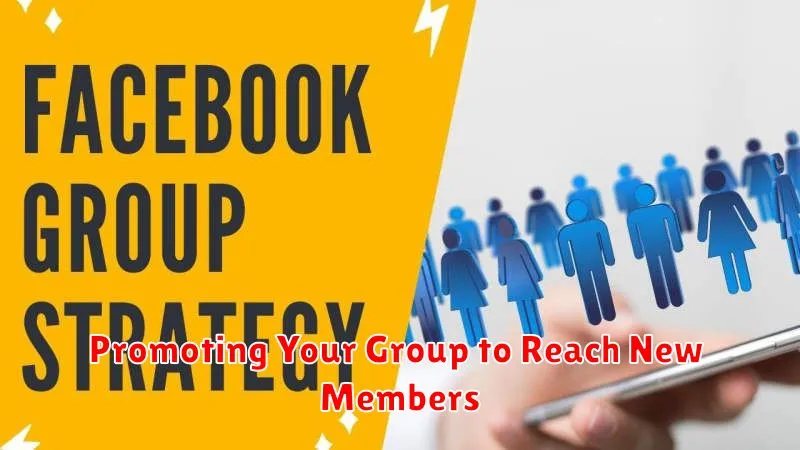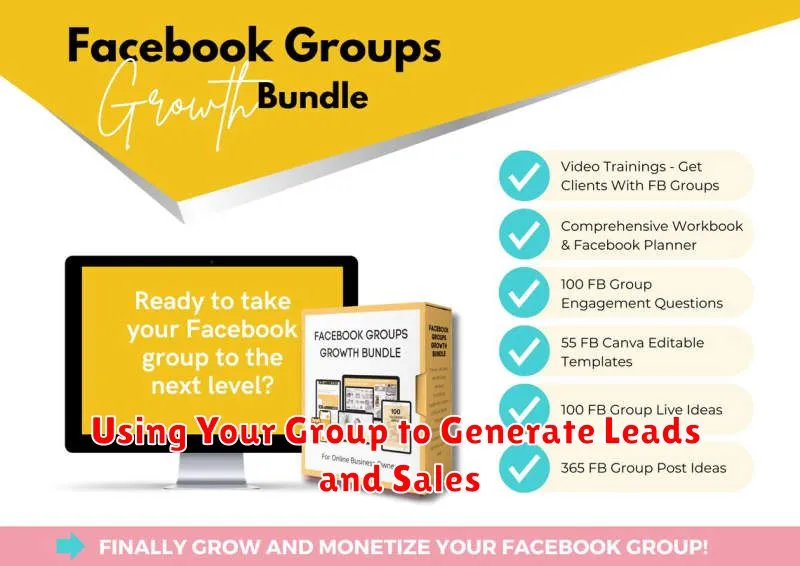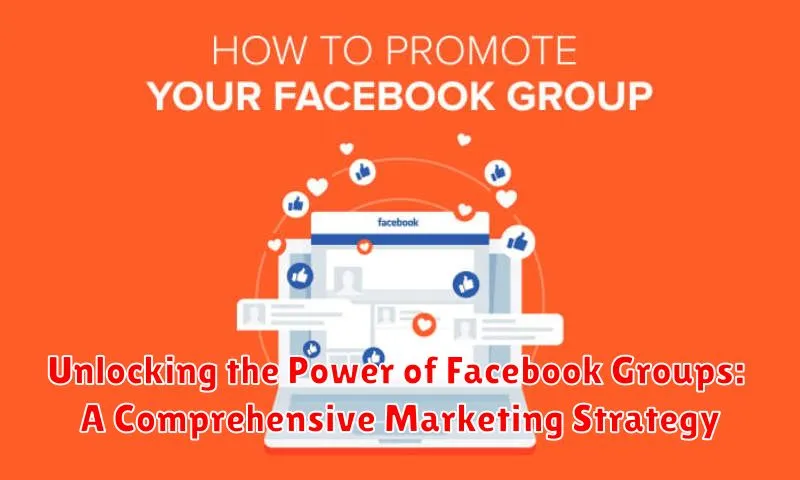In today’s digital landscape, harnessing the power of online communities is crucial for any successful marketing strategy. Facebook Groups offer a unique and powerful platform to connect with your target audience, build brand loyalty, and drive significant business growth. This comprehensive guide will delve into the intricacies of leveraging Facebook Groups for marketing, providing actionable strategies to unlock their full potential and achieve tangible results. We will explore how to create engaging content, foster a thriving community, and ultimately convert group members into loyal customers.
This article will equip you with the knowledge and tools necessary to transform your Facebook Group into a vibrant marketing hub. From establishing clear objectives and identifying your ideal audience to crafting compelling content and implementing effective moderation techniques, we’ll cover every aspect of Facebook Group marketing. Learn how to cultivate meaningful connections, generate leads, boost conversions, and ultimately maximize your return on investment through the strategic utilization of Facebook Groups.
Identifying Your Target Audience and Niche
Before launching a Facebook Group, it’s crucial to identify your target audience and niche. Understanding your audience is the foundation of a successful Facebook Group marketing strategy.
Ask yourself these key questions: Who are you trying to reach? What are their interests, pain points, and online behaviors? What specific needs or problems can your group address? Defining your niche helps narrow your focus and attract a highly engaged audience.
Consider conducting thorough market research to gather data on your target demographic. This information can include their age, location, profession, interests, and purchasing habits. Understanding these characteristics will enable you to tailor your group’s content and activities to resonate with your ideal members.
Clearly defining your niche also helps differentiate your group from competitors and establish a unique value proposition. This specificity will attract members who are genuinely interested in your group’s topic, fostering a thriving community.
Creating a Facebook Group with a Clear Purpose
Once you’ve identified your target audience, the next crucial step is creating a Facebook Group with a well-defined purpose. This purpose will guide all your future activities within the group and attract the right members.
Start by choosing a compelling group name that clearly reflects the group’s focus. A clear name helps potential members understand what your group is all about at a glance.
Next, write a detailed group description. This is your chance to elaborate on the group’s purpose, rules, and expectations. Clearly state the topics discussed and the benefits of joining. A well-crafted description acts as a welcome mat, inviting the right members and setting the tone for a positive community experience.
Finally, decide on your group’s privacy settings. Will it be a public, closed, or secret group? Consider your target audience and the level of exclusivity you want to maintain. Each setting offers different levels of visibility and control over membership.
Building a Strong Community and Engagement
A thriving Facebook Group hinges on active community participation and consistent engagement. Foster a welcoming environment where members feel comfortable interacting with each other and you. Respond promptly to comments and questions, demonstrating your presence and commitment.
Encourage discussions by posing open-ended questions related to your niche. Host regular Q&A sessions or themed days to spark conversation. Acknowledge valuable contributions and highlight active members to build a sense of belonging.
Establish clear group guidelines to maintain a positive and respectful atmosphere. This will help prevent spam and ensure conversations remain productive and on-topic. Actively moderate the group, removing inappropriate content and addressing conflicts constructively.
Developing a Content Strategy for Your Group
A well-defined content strategy is crucial for maintaining an active and engaged Facebook Group. This strategy should align with your overall marketing goals and cater specifically to the interests of your target audience within the group.
Begin by understanding what type of content resonates with your members. Ask questions, conduct polls, and monitor discussions to identify trending topics and areas of interest. This valuable feedback informs the creation of relevant and engaging content.
Variety is key. Experiment with different content formats, such as text posts, videos, live sessions, and even user-generated content. This keeps the group dynamic and caters to diverse learning styles.
Establish a consistent posting schedule. Regular updates keep your group top-of-mind and encourage consistent engagement. However, prioritize quality over quantity. It’s better to post less frequently with highly valuable content than to overwhelm your members with irrelevant or low-quality posts.
Promoting Your Group to Reach New Members

Promoting your Facebook Group effectively is crucial for expanding your reach and attracting your target audience. A multi-faceted approach works best.
Leverage your existing network. Announce your group on your personal profile, business page, and other relevant groups you manage. Briefly explain the group’s purpose and benefits of joining.
Run targeted Facebook ads. Utilize Facebook’s ad platform to reach specific demographics and interests aligned with your group’s niche. Craft compelling ad copy and visuals to attract potential members.
Cross-promote with other platforms. Share your group link on your website, email newsletter, and other social media channels. Encourage your existing audience to join the conversation.
Collaborate with influencers or related groups. Partner with influencers or other groups in your niche to reach a wider audience. Consider co-hosting events or cross-promoting each other’s groups.
Engage in relevant Facebook communities. Participate actively in other groups related to your niche. Share valuable insights and subtly mention your group when appropriate, ensuring it aligns with the conversation and doesn’t come across as spam.
Moderating Your Group Effectively
Effective moderation is crucial for maintaining a healthy and engaging Facebook Group. A well-moderated group fosters a positive environment, encourages participation, and ultimately contributes to achieving your marketing goals. Consistency is key; establish clear guidelines and enforce them fairly.
Establish Clear Group Rules. Outline acceptable behavior and content. This sets expectations for members and provides a framework for moderation decisions. Communicate these rules clearly in the group description or a pinned post.
Respond Promptly to Member Posts and Comments. Address questions, concerns, and conflicts quickly. This demonstrates your active presence and commitment to the group’s well-being.
Deal with Conflict Constructively. Mediate disputes impartially and fairly. Focus on de-escalating tense situations and finding resolutions that benefit the group as a whole.
Remove Inappropriate Content. Spam, offensive language, and irrelevant posts should be removed swiftly to maintain the group’s quality and focus.
Running Contests and Giveaways to Boost Engagement
Contests and giveaways are excellent tools for invigorating your Facebook Group and driving engagement. They provide incentives for members to participate actively and attract new members interested in the prizes offered.
When structuring a contest or giveaway, ensure the prize is relevant to your group’s niche and appealing to your target audience. A clearly defined set of rules and entry requirements is crucial for a smooth and fair process. Consider requiring actions that promote engagement, such as liking posts, commenting, or sharing the contest with their network.
Promote the contest or giveaway within your group and across other social media channels to maximize reach. Announce the winner promptly and transparently to maintain trust and encourage future participation. Regularly analyzing the results will help refine future contests for optimal impact.
Leveraging Facebook Group Insights
Facebook Group Insights provides valuable data that can inform your marketing strategies. Understanding these insights is crucial for optimizing your group’s performance and achieving your marketing goals.
Key metrics to track include growth (new members, membership requests), engagement (posts, comments, reactions), and active members. Analyzing these metrics reveals what content resonates with your audience, the best times to post, and the overall health of your group.
Use the Popular Days and Times data to schedule posts for when your audience is most active. Top Posts insights highlight successful content, providing direction for future posts. Membership requests offer insight into audience interest and potential growth opportunities. By regularly reviewing and acting upon these insights, you can continuously refine your approach and maximize your group’s impact.
Using Your Group to Generate Leads and Sales

Facebook Groups can be a powerful engine for generating leads and driving sales, but it requires a strategic approach. Avoid overtly promotional tactics that can alienate your group members. Instead, focus on providing value and building trust.
Subtly introduce your products or services within the context of helpful discussions. For example, if you sell fitness equipment, answer questions about exercise routines and mention how your product can assist. Share testimonials and case studies from satisfied customers, highlighting the benefits they’ve experienced.
Run targeted promotions and exclusive offers specifically for your group members. This creates a sense of community and rewards their engagement. Consider using Facebook’s built-in features for selling directly within the group, if applicable.
Engage with your members and actively participate in discussions. Answer questions, offer advice, and address concerns. This builds credibility and positions you as a trusted expert in your field. Remember, fostering strong relationships within your group is key to converting members into customers.

